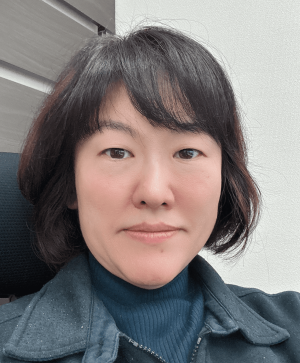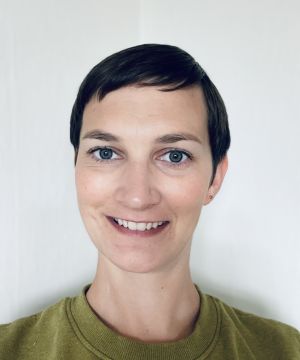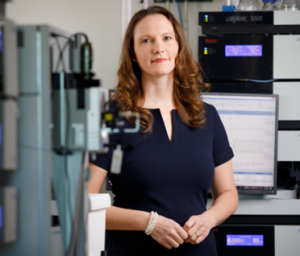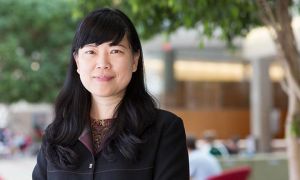GlyGen Webinar Series
The GlyGen project organizes public webinars on diverse topics, ranging from bioinformatics databases to new glycomics analysis techniques producing interesting data. Recordings of the talks are released on the GlyGen YouTube channel.
May 7, 2024 - Lara Mahal

Adding a little sugar: how incorporating glycomics into multi'omic analysis reveals new biological insights
Lara Mahal, Ph.D.
University of Alberta
Glycosylation is an often underappreciated aspect of biology and is rarely incorporated into multi'omic systems biology. Our laboratory pioneered lectin microarray technology and has been using this method to integrate glycomic data into large multi'omic datasets. Here, I will discuss some of our latest work showcasing the importance of including the glycome.
Zoom Meeting Details
Date: Tuesday May 7, 10am ET
Meeting link: https://gwu-edu.zoom.us/j/99658637793
Meeting ID: 996 5863 7793
Add to Calendar: Google | Outlook
Recorded Talk Video: TBA
Link: https://apps.ualberta.ca/directory/person/lkmahal
April 9, 2024 - Kristian Axelsen

Glycobiology in the Rhea knowledgebase
Kristian Axelsen, Ph.D.
SIB-Rhea
Switzerland
Rhea is a FAIR resource of expert curated biochemical and transport reactions described using the ChEBI ontology of small molecules, and is the reference vocabulary for enzyme annotation in UniProtKB. In this talk I will give a general presentation of the Rhea database, and also explore the curation of glycan metabolism in Rhea and UniProt, and opportunities to improve interoperability with GlyGen and other glycobiology community standards.
Recorded Talk Video: TBA
Link: https://www.sib.swiss/people/Kristian.Axelsen
March 12, 2024 - Juan Antonio Vizcaino

The PRIDE database and ProteomeXchange: Making Proteomics data FAIR
Juan Antonio Vizcaino, Ph.D.
EMBL-EBI
UK
The ProteomeXchange consortium has standardized data submission and dissemination of public MS proteomics data worldwide. ProteomeXchange resources are committed to comply with the FAIR (Findable, Accessible, Interoperable, Re-usable) principles, support reproducible research and represent the state-of-the-art in proteomics with regards to open data practices.
Within ProteomeXchange, the PRIDE database at the European Bioinformatics Institute is the most used resource worldwide, accounting for ~80% of all submitted datasets. The perceived reliability of PRIDE and the rest of the ProteomeXchange resources has enabled an unprecedented increase in the amount of proteomics data in the public domain, which is now comparable to other omics fields such as transcriptomics.
One concrete example of data re-use is the PTMeXchange project. In PTMeXchange, we are reanalyzing public enriched datasets in PTMs (post-translational modifications such as phosphorylation). The main aim is to disseminate high-quality PTM data to UniProt, linking it to the original mass spectrometry evidence in PRIDE and/or other ProteomeXchange resources. The overall aim is to make PTM data FAIR. The same framework could be used for glycoproteomics data in the future.
Link: https://www.ebi.ac.uk/people/person/juan-vizcaino/
February 27, 2024 - Kiyoko Aoki-Kinoshita

Glycoinformatics: past, present and future
Kiyoko Aoki-Kinoshita, Ph.D.
Soka University, Tokyo
Japan
Over the last twenty years, the field of glycoinformatics has expanded enormously: starting with just a handful of databases, there are now a plethora of databases, Web tools, software packages and Web portals. We can expect that technologies will continue to develop; thus, it will be important to be able to find our way through these informatics resources. Recollections, current trends, and future thoughts on where glycoinformatics may lead us will be discussed.
Link: https://www.linkedin.com/in/kiyokof/
Slides: Slides in Prezi
January 30, 2024 - Clement Potel

Deep quantitative glycoproteomics reveals gut microbiome induced remodeling of the brain glycoproteome
Clement Potel, PhD
EMBL Heidelberg
Germany
Methods capable of quantifying glycosylation dynamics are essential to start unraveling the biological functions of protein glycosylation. Here we introduce an approach that combines high-throughput sample preparation, high-sensitivity detection, and precise multiplexed quantification of protein glycosylation. We applied our methodology to characterize surface-exposed glycoforms, identify glycosites driving tissue-specificity and were able to demonstrate that the presence of a defined gut microbiota resulted in extensive remodeling of the brain glycoproteome when compared to that of germ-free animals.
Link: https://www.embl.org/groups/savitski/
December 12, 2023 - Daniel Bojar

From Complexity to Clarity: Algorithmic Exploration of Glycans
Daniel Bojar, PhD
University of Gothenburg
Sweden
Navigating the intricate world of glycans requires innovative approaches to untangle their complexity and reveal their functional roles. By merging advanced computational techniques with cutting-edge glycoscience research, we have developed a set of innovative tools that provide deeper insights into glycan properties and functions, shedding light on their roles in health and disease. As will be presented in the talk, we combined these approaches in our hub program, glycowork, including glycan sequence analysis, glycomics data analysis, biosynthetic analyses, and many more.
Link: https://www.linkedin.com/in/daniel-bojar-418647b2/
November 28, 2023 - Nadine Samara

Evolution of the diverse substrate specificities of mucin-type O-glycosyltransferases (GalNAc-Ts) from pathogen to host
Nadine Samara, PhD
National Institute of Dental and Craniofacial Research (NIDCR)
National Institutes of Health (NIH)
N-acetylgalactosaminyl transferases (GalNAc-Ts) are conserved from protozoa to mammals and catalyze the transfer of N-acetylgalactosamine (GalNAc) to Ser or Thr on protein substrates to initiate mucin-type O-glycosylation, an abundant and complex post-translational modification that regulates protein stability, structure, and function. Mucin-type O-glycosylation influences the rigidity of a cyst wall that encapsulates the infectious and currently untreatable bradyzoites of the protozoan pathogen Toxoplasma gondii (T. gondii). Our studies highlight GalNAc-T evolution in substrate recognition and enzyme function from protozoan pathogen to mammalian host and lay a framework for specifically inhibiting T. gondii-GalNAc-Ts in toxoplasmosis.
October 31, 2023 - Stacia R. Engel

The Awesome Power of SGD
Stacia R. Engel, PhD
Department of Medicine
Stanford University
The Saccharomyces Genome Database (SGD, https://www.yeastgenome.org) is the community resource for the most widely used scientific model organism, the budding yeast Saccharomyces cerevisiae. The SGD project provides encyclopedic information about the yeast genome and its genes, proteins, and other encoded features, including the reference genome sequence and official S. cerevisiae genetic nomenclature, all gathered and maintained through high-quality manual curation of experimental results as reported in peer-reviewed scientific literature. This complex collection of information is integrated with a variety of bioinformatic tools, a powerful query engine, a vast data warehouse, and a rich genome browser, then presented to users via a series of locus summary pages, in order to facilitate experimental design and analysis, allowing productive discovery of new biological details.
Link: https://www.linkedin.com/in/staciaengel/
September 26, 2023 - Marissa Maciej-Hulme

Pushing new frontiers in GAGomics
Marissa Maciej-Hulme, PhD
Department of Pharmacy
Oslo Metropolitan University Centre
Oslo, Norway
Glycosaminoglycans (GAGs) are long linear mammalian polysaccharides synthesized on select protein cores that play a plethora of roles in development, homeostasis, and disease. GAGomics seeks to profile GAGs using mass spectrometry and bioinformatics for the identification of significant structures as diagnostics and treatment targets. Dr. Marissa Maciej-Hulme will explore the current status of GAGomics as well as future directions of the field.
Link: https://www.linkedin.com/in/marissa-maciej-hulme-38b5b651/?originalSubdomain=nl
August 22, 2023 - Manfred Wuhrer

Mass spectrometry glycomics of tissues and biofluids
Manfred Wuhrer, PhD
Center for Proteomics and Metabolomics
Leiden University Medical Centre
Leiden, Netherlands
Glycans play key roles in the etiology of many diseases. They shape cell-cell interactions and are entry points for pathogens. Mass spectrometry is emerging as the key technology assessing glycans in human specimens such as blood, saliva and biopsies. My laboratory develops mass spectrometry workflows which we apply for assessing the glycomic dimension of human diseases, with the aim of obtaining therapeutic and diagnostic leads for improving health.
Recorded Talk Video: https://www.youtube.com/watch?v=F-B6kltstKM
Link: Manfred Wuhrer (University Leiden)
April 18, 2023 - Harry Brumer

CAZypedia – A Living Encyclopedia of Carbohydrate-Active Enzymes
Harry Brumer, PhD
Department of Chemistry
The University of British Columbia
Vancouver, BC, Canada
CAZypedia was initiated in 2007 to create a comprehensive, living encyclopedia of the carbohydrate-active enzymes (CAZymes) and associated carbohydrate-binding modules. CAZypedia is closely connected with the actively curated CAZy database, which provides a sequence-based foundation for the biochemical, mechanistic, and structural characterization of these diverse proteins. Now comprising over 200 individual Curator Approved family pages, , CAZypedia is a successful example of dynamic, community-driven, and expert-based biocuration.
Link: CAZypedia
March 28, 2023 - Rebekah L. Gundry

Expanding our View of the Cardiac Surfaceome: New Bioinformatic Tools and Technologies for Mapping Glycoproteins and Glycans from Small Sample Sizes
Rebekah L. Gundry, PhD
Department of Cellular & Integrative Physiology, College of Medicine
University of Nebraska Medical Center
Omaha, NE, USA
Cell surface glycoproteins and glycans play critical roles in a range of biological functions and disease processes. However, the lack of facile methods for sample preparation and data analysis has historically posed major challenges to their characterization. This presentation will describe the new CellSurfer and glyPAQ platforms for robust and rapid mass spectrometry-based analysis of cell surface glycoproteins and glycans and their applications to the human heart.
Link: Lab webpage
February 07, 2023 - Christopher M. West

A brief excursion through the glycobiology of unicellular eukaryotes
Christopher M. West, PhD
Complex Carbohydrate Research Center
University of Georgia
Athens, GA, USA
Unicellular eukaryotes have evolved diverse adaptations to many earthly environments, including as pathogens of human and plant hosts. Their glycosylation is often similarly varied, and the extant record reflects a combination of evolutionary history and contributions to fitness that are only beginning to be explored in detail. I will introduce select aspects of the glycomics, glycogenomics and glycobiology of the soil-borne amoebozoan Dictyostelium discoideum, the apicomplexan human pathogen Toxoplasma gondii, and the agent for Chagas disease Trypanosoma cruzi.
Link: Lab webpage
December 06, 2022 - Lingjun Li

Advancing Glycomics and Glycoproteomics via MultiplexedChemical Tagging Technology
Lingjun Li, PhD
School of Pharmacy and Department of Chemistry
University of Wisconsin-Madison
Madison, WI, USA
Glycosylation is one of the most important and most complex protein post-translational modifications. Alterations in glycomic profiles have been linked to various diseases, including cancer, neurodegenerative disorders, and cardiovascular problems. Thus, new methods are needed for quantitative analysis of glycans to facilitate the elucidation of their diverse functional roles in human diseases.Advances in mass spectrometry (MS)-based glycoproteomics and glycomics are increasingly enabling qualitative and quantitative approaches for site-specific structural analysis of protein glycosylation. In this presentation, Iwill describe our recent efforts in developing both MS1 and MS2-based relative quantification strategies for glycomic and glycoproteomicanalysis ofbiological samples. Several cost-effective and novel isobariclabeling reagents will be highlighted for their utility in quantitativeglycanand glycopeptideanalyses ofhuman serum and cerebrospinal fluid samples.
Recording of the Talk: YouTube
Link: Lab webpage